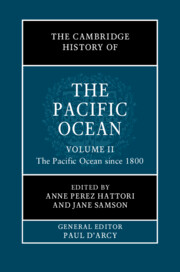Book contents
- The Cambridge History of the Pacific Ocean
- The Cambridge History of the Pacific Ocean
- The Cambridge History of the Pacific Ocean
- Copyright page
- Contents
- Figures
- Tables
- Contributors to Volume II
- Frontispiece
- General Editor’s Introduction
- Preface to Volume II
- Part VII Rethinking the Pacific
- Part VIII Approaches, Sources, and Subaltern Histories of the Modern Pacific
- Part IX Culture Contact and the Impact of Pre-colonial European Influences
- Part X The Colonial Era in the Pacific
- Part XI The Pacific Century?
- Part XII Pacific Futures
- 60 Ancestral Voices of the Sea
- 61 Defining the Contours of the Lagoon
- 62 New Pacific Voyages since Independence
- 63 Creating Sustainable Pacific Environments during the Anthropocene
- 64 Concluding Reflection
- References to Volume II
- Index
64 - Concluding Reflection
‘Choppy Waters’
from Part XII - Pacific Futures
Published online by Cambridge University Press: 11 November 2022
- The Cambridge History of the Pacific Ocean
- The Cambridge History of the Pacific Ocean
- The Cambridge History of the Pacific Ocean
- Copyright page
- Contents
- Figures
- Tables
- Contributors to Volume II
- Frontispiece
- General Editor’s Introduction
- Preface to Volume II
- Part VII Rethinking the Pacific
- Part VIII Approaches, Sources, and Subaltern Histories of the Modern Pacific
- Part IX Culture Contact and the Impact of Pre-colonial European Influences
- Part X The Colonial Era in the Pacific
- Part XI The Pacific Century?
- Part XII Pacific Futures
- 60 Ancestral Voices of the Sea
- 61 Defining the Contours of the Lagoon
- 62 New Pacific Voyages since Independence
- 63 Creating Sustainable Pacific Environments during the Anthropocene
- 64 Concluding Reflection
- References to Volume II
- Index
Summary
Pacific. Peaceful. Placid. Pacifying. Magellan named our Ocean in 1519 because of the calm waters he encountered, then unaware of its life-threatening typhoons and hurricanes, tsunamis and tidal waves, undertows and rip currents. Those of us who make the Pacific our home know it to be an ocean of vivid contrasts, an ocean whose spirits and power one never takes lightly, regardless of how ‘pacific’ the waters might appear. These conflicting understandings of the ocean have likewise informed our lives as Pacific peoples for centuries as these contrary understandings of the ocean are indeed mirrored more broadly in our daily realities. The world at large may think of Pacific Islanders as beach-going, hula-dancing, laughter-filled peoples for whom there is not a care in the world, yet that superficial stereotype works mainly to feed the self-interests of those swimming in the warm waters of tourism, colonialism, and militarism. The reality is infinitely more complex, not only today in the face of global warming, overfishing, and oceanic pollution, but also in the past when Islanders faced the daunting challenges of their eras. Coping and thriving in the face of natural disasters, diseases, and invasions of all sorts are stories not new to Oceania. In this placid Pacific, we live a life of contrasts. Always have.
- Type
- Chapter
- Information
- The Cambridge History of the Pacific Ocean , pp. 802 - 804Publisher: Cambridge University PressPrint publication year: 2023

